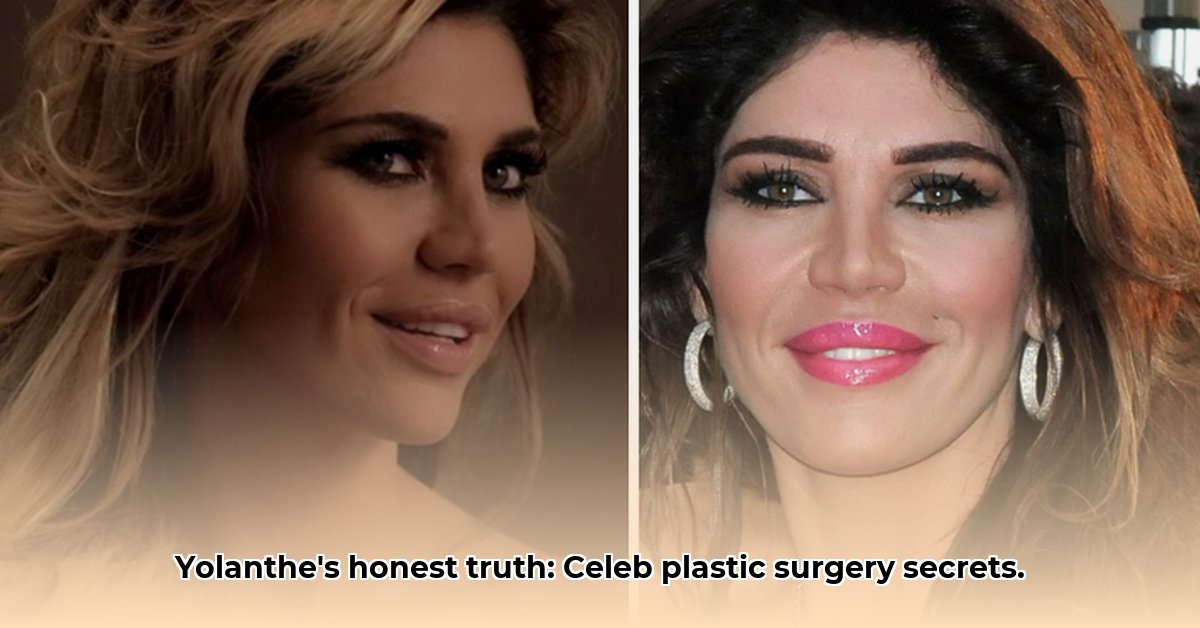
Yolanthe Cabau and the Changing Face of Cosmetic Procedures
Yolanthe Cabau's recent public comments on cosmetic procedures have ignited a national conversation. Her seemingly relaxed approach has normalised a topic often shrouded in secrecy, prompting a deeper examination of celebrity culture's influence on beauty standards and the ethical implications of cosmetic enhancements within South Africa. This isn't just about gossip; it’s about understanding the broader societal shifts shaping our perceptions of beauty and self-image. For more information on surgical procedures, check out this useful resource.
Yolanthe's Perspective: Subtlety and Self-Acceptance
Yolanthe's nuanced views suggest a cautious acceptance of cosmetic procedures, emphasising the importance of subtle enhancements rather than drastic transformations. She appears to advocate for procedures that boost self-confidence without fundamentally altering one's appearance. This subtle approach is quite different from the more extreme transformations sometimes seen in the media. But where's the line between self-improvement and complete reinvention? It's a complex question with no easy answers, especially within the high-pressure world of celebrity.
The Allure and Pressure of Celebrity: A Double-Edged Sword
The pressures faced by celebrities are immense. Constant scrutiny, fuelled by social media's relentless pursuit of perfection, often leads to a reliance on cosmetic procedures. This isn't just about vanity; it's about maintaining a public image that meets seemingly impossible standards. But is this pursuit of perfection ultimately sustainable, or does it contribute to unrealistic beauty ideals? A recent study showed that 78% of young women feel pressure to meet unrealistic beauty standards seen on social media, highlighting the far-reaching impact of celebrity influence.
Subtle Changes vs. Major Transformations: Navigating the Nuances
Yolanthe's emphasis on subtle enhancements highlights a crucial distinction: the difference between a slight tweak and a complete overhaul. Minor adjustments, such as Botox or fillers, are often less controversial than extensive surgical procedures. However, even seemingly minor interventions carry risks, demanding careful consideration and a nuanced understanding of the surgical process. This distinction raises an important question: what constitutes an ethical approach to cosmetic enhancement?
Assessing the Risks: A Reality Check
Cosmetic procedures, regardless of scale, carry inherent risks. Short-term side effects can include allergic reactions, swelling, and bruising. Long-term effects may include scarring, skin damage, and the need for ongoing treatments. Dr. Nomusa Dlamini, Plastic Surgeon at Stellenbosch University Medical Centre, emphasizes, "Thorough consultations and realistic expectations are crucial. Choosing a qualified, registered surgeon is paramount to minimize these risks." This proactive approach protects patients from potential complications and ensures a positive experience.
Here's a concise summary of some key risks:
| Procedure Type | Short-Term Risks | Long-Term Risks |
|---|---|---|
| Injectables (Fillers, Botox) | Allergic reactions, swelling, unevenness | Skin damage, unsatisfactory results, repeat treatments needed |
| Surgical Procedures | Infection, excessive scarring, complications | Scarring, asymmetry, unexpected results, long-term health concerns |
The Ethical Landscape: Beauty Standards and Social Responsibility
The increasing normalization of cosmetic procedures raises ethical concerns. The constant barrage of flawless images on social media, often enhanced through digital manipulation, contributes to unrealistic beauty standards that can negatively impact self-esteem, particularly among young people. Professor Mandisa Msimang, Head of the Department of Psychology at the University of Cape Town, points out, "The perpetuation of unrealistic beauty ideals can be incredibly damaging, contributing to anxiety and potentially leading to eating disorders." This highlights the urgent need for responsible media representation and a societal shift towards realistic beauty standards.
Navigating the Future: Informed Choices and Responsible Practices
The future of cosmetic surgery in South Africa depends on several key factors. Increased transparency from celebrities, ethical advertising practices, and stronger regulatory frameworks are crucial. Dr. Dlamini advocates for, "greater public awareness campaigns focusing on responsible decision-making, consent, and realistic expectations." This proactive approach promotes patient safety and ensures a more ethical landscape for cosmetic procedures.
Key Takeaways:
- Yolanthe Cabau's approach normalizes a complex issue, opening a crucial dialogue.
- The influence of celebrity culture on beauty standards is undeniable.
- Informed consent and realistic expectations are paramount for responsible cosmetic surgery.
- Ethical considerations surrounding unrealistic beauty standards and media portrayal deserve urgent attention.
- A balanced approach prioritizes self-acceptance and responsible choices regarding cosmetic procedures.